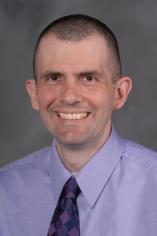Researchers at ĚěĚěłÔąĎ are embarking on their largest and most ambitious study ever to track 10,000 university students and follow them throughout their lifetimes.
The Student Life Study kicks off this fall, with administrators hoping to attract a pool of 10,000 ĚěĚěłÔąĎ State students to take part.

Psychology Professor John Gunstad, Ph.D., co-director of the study along with Professor Karin Coifman, Ph.D., said the goal is to gather a large and living pool of information that will provide data to help students in real-time and to guide university administrators, legislators and others who make educational policies and decisions.
“Being a college student is very difficult and the modern college student faces challenges that a lot of past generations did not,” Gunstad said. “We want to be able to do a very large research study to better understand, `What is it like to be a college student?’ in terms of things like mental health and physical health. What are the true factors that predict academic success and graduation and going on to a career that they love?”

Gunstad said no studies of this magnitude have ever focused on the transition from high school to college. “It’s a critical life stage and a missed opportunity,” he said.
“We’re hoping to be able to kind of fill that gap, particularly because there’s all this attention around the mental health crisis in college and the large number of individuals who are questioning if college is right for them,” he said.
Real-time Aid
Once information is gathered, the university can then identify needed interventions and provide immediate access to resources for students to help assist university wellness efforts.
“So, for an example, we’re going to have Sleep Week, because we know that many college students don’t sleep the way they should,” Gunstad said.

Study participants may get a simple text message asking them how many hours of sleep they got the previous night, then a graph featuring all the sleep data will be shared so that students can see how they compare to their counterparts.
“We’re going to be able to provide a bunch of free resources and information on improving sleep quality,” he said.
Other topics throughout the year may include stress management or heart health, all aimed at wellness intervention.
Shaping Policy
After research data and wellness intervention, Gunstad said the final goal of the study is to work with the university to structure programming and shape policies that will help students succeed.
Gunstad noted how roughly 40% of this year’s class of incoming students are first-generation college students.
“We know that on average nationwide, a first-generation student is more likely to struggle in their classes, and they’re less likely to graduate. But we also know there is a wide range of variability. Some of them are going to be our best and brightest. Others may not make it through the first semester,” he said. “So, with this large number of individuals in the study, we’re going to be able to drill down and find out what really are the risk factors and then what are the protective factors for a first-generation student to be successful.”
Once those factors are identified, the university will be better able to target programming and information sharing, even before students get to campus, to help ensure their success.
Signing up participants
Organizers officially kicked off the study on Aug. 17, and representatives were at KSU Kickoff and Blastoff! to sign up participants in the study. The study is based in room 146 of the Design Innovation Hub on the ĚěĚěłÔąĎ Campus.

Gunstad said he would like to sign up 3,000 to 4,000 students during the fall semester and reach 10,000 over the next year or so.
“It’s a bit ambitious,” he said. However, the study will offer incentives to students to enroll in the research project, including various prizes and giveaways such as a fitness tracker-style smartwatch that also will be used to gather data.
Following students for decades may seem like an impossible task but has been done many times, including the still-ongoing Nurses’ Health Study at Harvard University that began in 1976, the Framingham Heart Study at Boston University ongoing since 1948, and the Baltimore Longitudinal Study of Aging begun in 1958 by the National Institute on Aging.
Ideally, he would like to get the study to a point where students know that going to ĚěĚěłÔąĎ State means being part of the study and participation will be assumed.
“If you’re a Golden Flash, you just take part in the study because everyone does it,” he said, “It just becomes part of the culture.”

So far, the team has amassed about $450,000 in research funding to cover the first two years of the study. Gunstad said he expects initial success will help to generate additional money and even corporate donations. While faculty from the Department of Psychological Sciences are leading the study, more than 30 researchers from across the university will take part as investigators, and eventually the study will be expanded to include students from all ĚěĚěłÔąĎ State campuses, he said.
Because no one else in the country is conducting this type of broad research at the college level, Gunstad sees the Student Life Study as a way for ĚěĚěłÔąĎ State to make a mark in this area.
“Hopefully this is something ĚěĚěłÔąĎ State will become known for,” he said.
For more information on the Student Life Study or to register to participate visit www.kent.edu/student-life-study.

